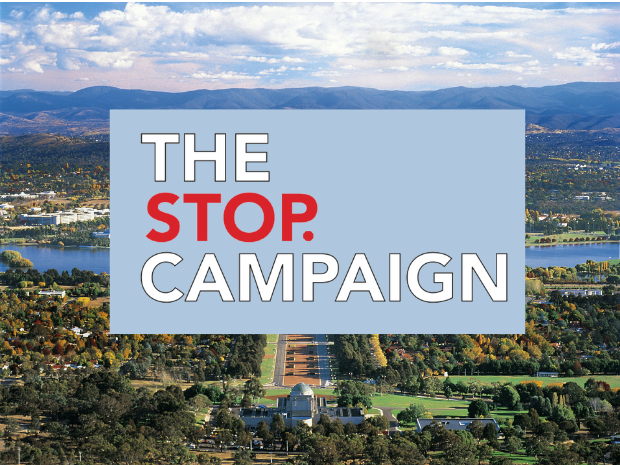The STOP Campaign’s ‘Largest Project to Date’: The ‘Safe Responses Toolkit’ Launches

By Georgie Ralphs
Content warning: sexual violence, institutional betrayal
On a typical clement Sunday you may expect to find the RUC brimming with sports fans and tipsy barefoot patrons spilling out onto the lawns outside. Yet on Sunday 22 May, the RUC’s function space was reclaimed by activists of all ages, gender identities and backgrounds for The STOP Campaign’s launch of the Safe Responses Toolkit; “a comprehensive toolkit for sexual violence victim-survivors and their supporters within the ACT.”
The STOP Campaign is a grassroots organisation “focused on tackling sexual violence in Australian learning communities ”. It was founded in 2018 by ANU alumnus Camille Schloffel and many of the Campaign’s members are former or current ANU students.
In a media statement to Observer, Audrey Mims, member of The STOP Campaign and Team Leader of the SRT Subcommittee explained that one motivation for the Campaign’s “activism in this space is directly related to the institutional betrayal by the ANU towards students and staff who have experienced sexual violence.”
The Safe Responses Toolkit (SRT) is The STOP Campaign’s “largest project to date.”
It compiles information regarding the “legal, medical, reporting, advocacy and support” options available to victim-survivors in the ACT. It will significantly streamline access to the information victim-survivors need when navigating their response to an incident of sexual violence.
The SRT was researched, consulted, reviewed and created over 12 months with the help of more than 60 volunteers, “committed to enhancing the autonomy of victim-survivors and centering their stories and lived experiences.”
Many of these volunteers “have lived and studied at ANU and know firsthand how influential this resource would be within the ANU community.”
Over 60 organisations and individuals helped to review the SRT, including advocates, ACT government departments, community members and research bodies.
The STOP Campaign told Observer that the creation of the SRT has proven this information in the ACT “lacks accessibility and coherence, is not trauma-informed, is difficult to locate and is shrouded in a culture of distrust towards institutions which have historically betrayed victim-survivors.”
They described the current available information as “outdated, incorrect and not reflective of the actual processes victim-survivors are faced with when reporting and seeking support.”
At the launch, the consequences of inaccessible information were brought home by two brave, anonymous victim-survivors who shared their experience responding to sexual violence.
Mims explained that returning to the “moving… voices of victim-survivors” helped “acknowledge the huge impact that the pre and post-crisis support services make in their lives.”
Schloffel echoed this sentiment in her final address to the crowded, passionate room.
“The SRT will change lives.”
A PDF version of the SRT is available here.
Support is available:
Canberra Rape Crisis Center 02 6247 2525 (7am–11pm) or 131 444 (after hours)
1800 RESPECT 1800 737 732
Domestic Violence Crisis Service
Lifeline 13 11 14
ANU Counselling [email protected]
ANU Student Wellbeing [email protected]
ANUSA Women’s Officer [email protected]
Know something we don’t know? Email [email protected] or use our anonymous tip submission.
If you have an issue with this article, or a correction to make, you can contact us at [email protected], submit a formal dispute, or angery react the Facebook post.
Want to get involved? You can write articles, photograph, livestream or do web support. We’re also looking for someone to yell “extra!” outside Davey Lodge at 1AM. Apply today!









